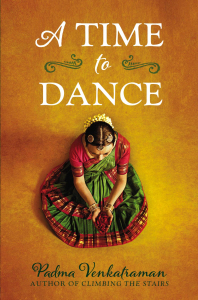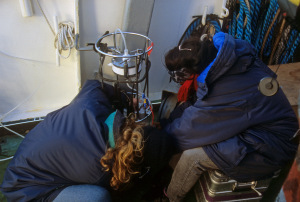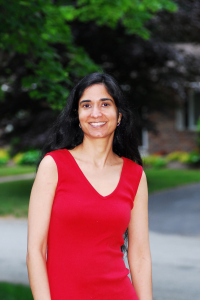National Poetry Month: Guest Post from Padma Venkatraman: For Better or Verse
When I heard the voice of Veda, the protagonist of A TIME TO DANCE, in my head, I was petrified. Not because it felt like schizophrenia, by the way. I’m used to that feeling. As far as I’m concerned, when I’m writing, I’m just experiencing a mild form of schizophrenia. I always have. I actually enjoy hearing voices in my head.

Nancy Paulsen Books, May 2014.
What scared me was that this time, the story was appearing in a form I’d never used before to write fiction: verse.
I was trained as an oceanographer, so I’ve spent a large part of my life working in laboratories or on ships. And although I’ve read a tremendous amount of poetry in my life, I’ve never really taken a formal course in literature of any sort. How dare I write novels…let alone write a novel in what was, perhaps, poetry?
I tried ignoring Veda’s voice, but she didn’t let go of me. I tried writing her story in normal prose, but that just didn’t ring true.
Then, I went to the library and wasted time trying to figure out whether what I was writing was prose or poetry.
One night, right in the middle of this struggle, I remembered that my first piece of published writing had been poetry.

Padma working in a Lab.
Several decades ago (I won’t say precisely how many), when I was about 8 years old, I (with the supreme confidence of childhood) submitted a few poems to an established literary journal that was published in England on beautiful paper. As a child in India, I’ll admit that glossy paper attracted me as much as what was actually printed on it – most Indian publishers couldn’t afford nice paper. Miraculously, the journal accepted and published my work, alongside the work of established Indian and British poets.
The memory of that early acceptance helped me to silence my fears and listen fully to the voice in my head. At last, the writing flowed. Characters and emotions haunted my world and filled my days, the way they always do when I’m deep into a novel.
This isn’t to say I didn’t edit by the way – of course I did. It’s just a different “me” that does the editing (remember I said I was schizophrenic). On days when I can’t hear a voice, I don’t force it; instead I either get my machete and hack and slash at the words I’ve written, or else I read, read, read.
A TIME TO DANCE was completed last year, and by then I realized how well verse worked with the dance theme in the novel – form and function going together. Last week, the novel was launched in the Caribbean, where I was chief guest at a book festival – a marvelous honor for which I’m deeply grateful. In May, A TIME TO DANCE will be released in America, to starred reviews in Kirkus, Booklist, VOYA and SLJ, as well as an IndieBound citation. And looking back on the process of writing A TIME TO DANCE, I see that I’ve learned an incredible lesson, a lesson that I hope will be useful to other writers as well.
The lesson: Cultivate your schizophrenia.

Padma working aboard a research ship.
Nuture your creative self by doing whatever it takes to still your mind. For me, it’s usually yoga (pranayama) and meditation. On some rare days, though, it takes quite the opposite approach to make my mind quiet: I have to enter a café so noisy I can’t hear my own fears piping up. Find what works best for you in terms of not letting your intellect get in the way when you are in the “writing” mode; and do all you can to foster your self-confidence from within (don’t obsessively seek external recognition). Listen to your loved ones (my young one told me – mommy, your books are the best in the world even though I haven’t read them yet), believe them, revel and luxuriate in the warmth of supportive memories.
When you’re in the writing zone, whether it lasts five minutes (yes, sometimes it’s that short for me, I have a young child), or five hours (a luxury for me at this point), don’t worry about rhythm or meter or any other thing. Just write, write, write.
On days when you aren’t feeling inspired, don’t push yourself to write. Instead, edit your work or to read other people’s work critically. Reading develops and strengthens that other part of your split personality – your editorial self.
I’ve read, read, read. I’ve recited Sanskrit hymns, sung Tamil poems, read poems in French, German and of course, my most beloved language – the language I write in – English. I’ve read long dead poets like Shakespeare, Keats, Elliot, Rilke and Celan as well as living poets such as Charles Bernstein and Martha Rhodes and Maya Angelou and Chitra Banerjee Divakaruni. I’ve read prose poets like Peter Johnson who write for young adults, nonfiction poetry books like Borrowed Names and Carver: A Life in Poems, and even rhyming poems for children starting with Robert Louis Stevenson, and moving to Eileen Spinelli and Mary Ann Hoberman and beyond.
Sometimes unpublished writers tell me they don’t read poetry because they’re scared it will turn them into copycats. All I can say is, if you work at developing your writer’s schizophrenia, reading will only influence your intellectual editorial self. So long as you strengthen your self-confidence, you’re unlikely to imitate. You’ll stay original and creative.
Once you learn to find stillness within, you can open your eyes and ears and heart to the world outside. You can listen to the marvelous earth we live in and to the extraordinary universes of your imagination.
And you’ll be able to write – poetry, prose or something in-between – without wasting time wondering what other people may call it.

Padma Venkatraman.
Padma Venkatraman is the author of CLIMBING THE STAIRS and ISLAND’S END, both of which were released to multiple starred reviews and won several awards including (but not limited to): winner of the Julia Ward Howe Boston Authors Club award, winner of the ASTAL RI Book of the Year award, winner of the international SANOC South Asia Book award, winner of the Paterson Prize and many honors such as ALA BBYA, Booklist Editor’s Choice BBYA, Kirkus BBYA, Booksense Notable, Bank Street College of Education Best Book, New York Public Library Best Book for Teens, Capitol Choice, CCBC choice, Publishers Weekly Flying start etc. Her latest novel,A TIME TO DANCE, will be released to starred reviews in Kirkus, Booklist, VOYA and SLJ this May.
Written in verse, A TIME TO DANCE is a novel about Veda, a dance ingenue who loses her leg and struggles to dance again. Veda learns that to regain her passion, she must also learn to share it with others. She becomes a teacher, discovers romance, and awakens to the spiritual power of her art as her courage is tested to the extreme.
Visit Padma at www.padmasbooks.com, friend her on fb or follow her on twitter (@padmatv). She will be doing signings in New England, Virginia, DC, MD and CA this summer, and teaching a workshop at the University of Rhode Island’s Ocean State Summer Writing Conference in June.








